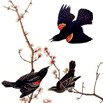Center, Internet, Wildlife Damage Management

Bird Control Seminars Proceedings
Document Type
Article
Date of this Version
September 1970
Abstract
At an earlier research seminar, Dr. John Seubert observed that available evi¬dence indicated the red-winged blackbird was going to be with us for some time, and perhaps we'd better learn to "live with it." Whereupon a representative of the com growers said if Dr. Seubert really believed that, he'd better look for a new job. I sincerely hope this attitude is not too widespread among corn producers and market¬ers; because if it is, we can expect a lot of pressure designed to force scientists to abandon their search for a safe method of reducing redwing damage. "Risk now, find out later" has been the guiding policy of pesticide makers, merchants, and control operators for some 30 years. I submit that this policy has cost the consumer and taxpayer far more than if DDT, and most other hard pesti¬cides, had never been discovered. Yesterday, when the evidence against persistent chemicals was not all in, risk-now-find-out-later advocates may have had some slight excuse for continuing their policy. Today, the evidence is in, - it is conclusive - there is no excuse (unless blinded by greed) for pursuing this suicidal course. Whether attempting to control mosquitoes, red-wings, or the most recent outbreak of corn blight, if risk now-find-out-later does not die soon, then we can expect a lot of sick and dying people within the decade. We already have a lot of sick and dying people as a result of environmental pollution. No one denies this. So, there is scant excuse for adding one more bird poison to the land unless and until we are certain of its side effects.

